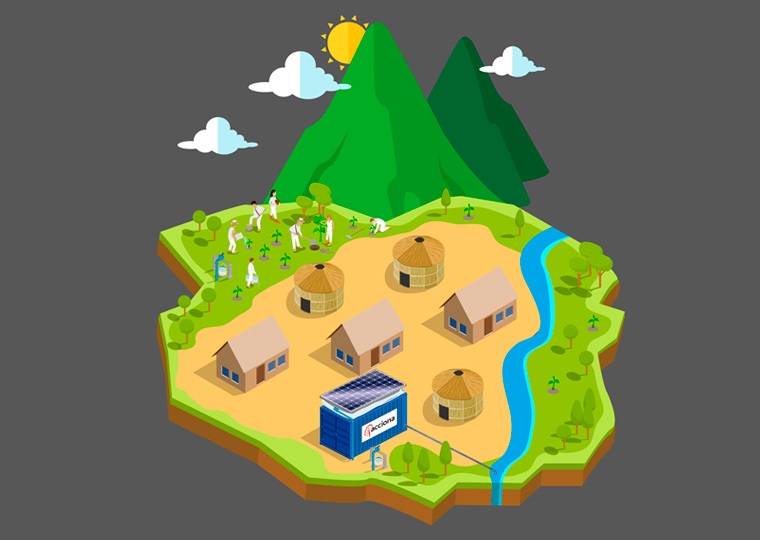-
ACCIONA has installed a purification plant driven by renewable energy to supply clean water to 400 people a day in the remote Seyamake community, who live in the mountains of north Colombia
-
At the foot of the Sierra Nevada de Santa Marta, protected by the highest coastal mountain range in the world, the Wiwa community of Seyamake live rooted in its surroundings like any other natural element. From its origins, this tribe of the municipality of Dibulla in northern Colombia understands the relationship it has with its habitat, through symbolism, ancestral rites and the worship of what it believes to be sacred.
Although physically near Riohacha, the capital of La Gaujira department, visiting Seyamake is to visit a place where time and the way humans treat the environment seemed to have stopped: for the Wiwa, a person forms part of nature and nature forms part of the person.
The Wiwa structure themselves in a hierarchical society where the Mamo is the traditional spiritual and political authority. Mamo means Sun, grandfather and adviser, and Saga, his wife, is the feminine authority, who embodies the Moon. Both have been specially educated to understand nature, society and people, to interpret their dreams, treat their illnesses and conduct the tribe’s ceremonies and rituals. There are as many Mamos as river basins extending over the Wiwa’s territory… and this is not an arbitrary distribution. As a Wiwa proverb says: “Before the Earth was created, everything was Water; we were bubbles of Water…”
-
“Without water, there is no life”. On the Arimaka plantation, the river that gives life to the Wiwa is the river Jerez. “Water is like a person. It breathes like we do. We breathe for it. Without water, there is no life,” explains Julián, an authority in the Seyamake community. It is precisely this water that allows the more than 200 inhabitants of the community to work their 400 hectares of cultivable land, one of their main livelihoods. The water from the river Jerez, however, reaches the Wiwa with high levels of contamination, as it ends the journey towards its estuary with the Caribbean. The pollution is causing death and disease among a people that suffers the rigors of industrialization, despite its efforts to live in harmony with nature. So that the Wiwa can continue with their traditional way of life, ACCIONA, in collaboration with Corpoguajira, the department’s environmental agency, and the United Nations Development Program (UNDP), embarked upon a project to clean up the Wiwa’s water.
-

-
Clean water for the Wiwa
Overcoming the huge difficulties of working on the ground, including the arduous transport and assembly of equipment, ACCIONA installed a drinking water purification plant in the Seyamake community with the capacity to treat eight cubic meters of water every hour, its 5,000-liter tank supplying clean and drinkable water to 400 people a day throughout the Seyamake community.
Also, the water treatment plant is powered by solar panels, such that it neither emits any kind of atmospheric pollution nor uses fuel to operate. Meanwhile, the electricity left over is used to pump untreated water up to a raised tank for irrigating crops.
Thanks to this technological helping hand, the Wiwa can now preserve their way of life, based on a relationship with water. The origin of existence, joined in the present with their hopes for the future.
To read more stories like this, visit the website of ACCIONA.





